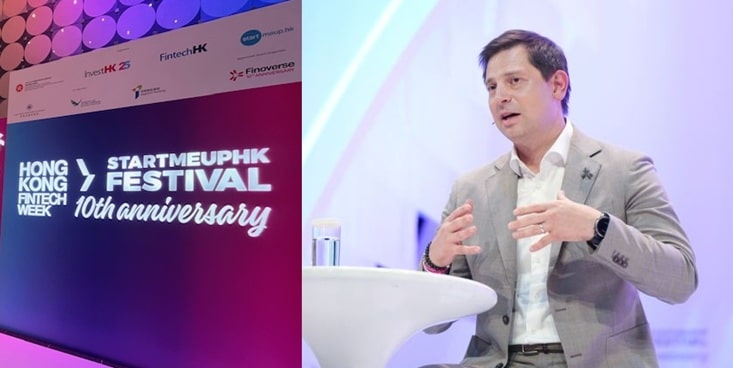HONG KONG, November 8, 2025 – As Hong Kong FinTech Week marked its 10th edition from November 3 – 7, 2025 — this year co-hosted with the StartmeupHK Festival — organiser Finoverse says the event has grown from a niche finance conference into a global platform for technology, innovation, and cross-border collaboration.
In an interview with AsiaBizToday, Anthony Sar, Co-Founder and CEO of Finoverse, reflected on the event’s decade-long evolution, Hong Kong’s edge as a fintech hub, and why the next frontier for artificial intelligence lies in making technology more human.
From Finance to a Broader Technology Ecosystem
Sar described this year’s milestone edition as the largest and most diverse yet, bringing together 37,000 participants, 800 speakers, and 700 exhibitors from more than 100 economies.
“We’re explored not only fintech, but also AI, blockchain, green finance, and health and insurtech,” Sar said. “This milestone edition shows how Hong Kong is evolving from a financial centre into a connector for global innovation.”
The 2025 edition introduced several new features, including the China Global Innovation Forum, the event’s first Mandarin-language stage to highlight Hong Kong’s role as a bridge between mainland China and the global market. The TechX Forum expanded engagement between founders, investors, and ecosystem builders, while the StartmeupHK initiative strengthened investor–startup matchmaking.
A Competitive Edge in Density and Diversity
With global fintech events gaining traction across Asia, Sar said Hong Kong FinTech Week retains its distinction as a platform that combines policy leadership with industry innovation.
“Few events convene Hong Kong’s top leadership — the Chief Executive, Financial Secretary, HKMA, and SFC — alongside global banks, fintech founders, and regulators,” he explained. “The week generates real outcomes: pilots, partnerships, and capital flows across more than 100 economies.”
He added that the convergence of policy, capital, and creativity within a single forum gives Hong Kong FinTech Week a competitive edge that extends beyond discussion into measurable business impact.
AI and the Human Trust Deficit
Despite advances in digital finance, public trust in AI remains limited. Recent surveys show only one in four Hong Kong consumers view AI positively. Sar attributes this trust gap to impersonal design and lack of accountability.
“AI has often been deployed as a cost-saving tool rather than a human-centred experience,” he said. “People encounter systems that automate rather than assist—and that erodes confidence.”
To rebuild trust, Sar argued that companies must restore clarity, consent, and value to user interactions. “People need to see how AI serves them, not just the company. When users feel heard, informed, and in control, trust follows.”
Samantha: A Voice-First AI at Scale
Finoverse tested those principles at scale through Samantha, a voice-driven AI community host launched at this year’s event. The system engaged more than 3,500 attendees in five-minute phone conversations about their goals and interests, then curated personalised introductions and itineraries among the 37,000 participants.
“The principle is simple — automate the routine, humanise the moments that matter,” Sar said. “A short, natural conversation achieved what long registration forms never could: genuine connection.”
The pilot measured match quality, time to meeting, and user satisfaction, with human oversight built into every stage. According to Sar, Samantha’s conversational freedom—unrestricted by pre-set buttons or menus — made it feel “refreshingly human.”
Designing for Trust and Inclusion
Sar believes voice-based AI systems could play a key role in bridging Hong Kong’s “trust deficit” by offering more natural, inclusive, and transparent interactions.
“Voice carries tone, nuance, and intent,” he explained. “It lets users clarify what’s happening in real time and makes digital services more inclusive, especially for those with visual or motor challenges.”
He added that voice-first interfaces also raise the bar for quality and compliance: “Users won’t tolerate poor design or vague consent. With explicit permissions, clear prompts, and transparent data choices, voice AI can enhance — not erode — user control.”
Lessons from Scaling AI to 37,000 Users
Reflecting on the pilot, Sar shared three lessons that shaped user experience and adoption:
- Clarity drives confidence – Users trust systems that explain their purpose and data use upfront.
- Speed and simplicity matter – A five-minute conversation replaced lengthy forms, saving time and increasing engagement.
- Human support is essential – On-site assistance and the “Samantha Café” offered tangible reassurance that help was available when needed.
“UX is now the primary engine for building trust,” Sar said. “A trustworthy system proves its competence and reliability through every micro-interaction.”
Building Cross-Border Fintech Collaboration
Looking ahead, Sar sees Hong Kong FinTech Week as a connector for Asia’s fintech ecosystems, fostering collaboration in areas such as AI, digital assets, and green finance.
This year’s edition featured 11 forums and a new China-Global Innovation Stage, attracting over 700 applications to the Global Fast Track (GFT) programme from more than 70 countries.
Our mission is to keep that ecosystem connected,” Sar said. “We want to ensure innovations born in Asia can scale globally and mature into sustainable, cross-market deployments.”
A Decade of Growth and Global Reach
As Hong Kong FinTech Week celebrated its tenth anniversary, Sar described its journey as both a mirror and a catalyst for Hong Kong’s transformation into a regional technology hub.
“Hong Kong’s strength lies in convening diverse communities — start-ups, regulators, investors, and policymakers — who together are shaping the next chapter of global finance,” he said.


